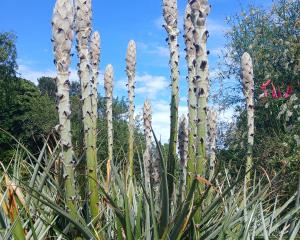Brought up in Nelson, Niall Shepherd puts capsicums and aubergines top of his wish list, along with citrus.
"And I'd love a big mango tree, avocados and a lemon. I miss my lemons," he says.
But Shepherd believes in concentrating on what grows well in an area, rather than hankering after the impossible.
"If it can't survive by itself outside, I shouldn't be growing it," he says.
It's a lesson he learned during 16 years policing on the West Coast, based at Arthurs Pass, 740m above sea level. For the past nine years, he has been taking the same line in Dunedin.
Carrots had to be lifted before winter - "Otherwise they just froze into solid lumps" - and although he could grow tomatoes outdoors in a sheltered spot, "they struggled".
Fortunately, he likes two of the hardiest vegetables, broad beans ("my favourite vege") and silverbeet ("it will grow anywhere"). Jerusalem artichokes and oca (yams) were also guaranteed to thrive.
Niall admits he started with a couple of advantages when he decided to put in a raised bed at his Arthurs Pass house.
"I had a ready supply of railway sleepers and more than two tonnes of potting mix."
The potting mix had been left when some would-be cannabis growers fled the area, so he had an excellent, weed-free growing medium for his vegetables.
There was no need to plant apples or gooseberries, as they grew on the roadsides, and he was "very happy" to find yellow raspberries growing wild throughout Arthurs Pass.
These, along with the Otira Valley's coltsfoot (Tussilago farfara), once used in homemade cough mixes, were settler introductions, Shepherd says.
One surprise wilding was a nectarine, that "two or three of us kept a close eye on" as the fruit ripened, although sometimes they arrived to find others had got in first and stripped the tree.
The supplements were enjoyable but, even with them, he never planned to be self-sufficient, saying, "The idea was to have something to do outside".
He also advocates swapping seeds, which is a good way to try different varieties and prevents waste, as few gardeners can use a packet of 200 vegetable seeds in a season. Shepherd has an exchange network of half a dozen people, including his father, who still gardens in the Nelson area.
Shepherd applies these principles in his new role at Age Concern, where he is manager for funding, communications and community projects. One of his tasks is to prepare the organisation's monthly newsletter, for which he is writing a series called "This bloke's garden".
The intention of the articles is to encourage older people to get into - or back to - gardening.
"It's an excuse to get out into the fresh air and there are the social benefits, like bragging to your neighbours," he says.
West Coast primulas have tale to tell
Flowers introduced by Europeans to the West Coast included a white primula, found near Klondyke Corner.
Said to have been named after Alaska's Klondike gold field, the spot, about 8km from Arthurs Pass settlement, was where Cobb and Co coaches forded the Waimakariri River.
Shepherd was told the primulas (pictured above) had been planted on a grave. The patch had spread downhill and every spring, the scented flowers bloomed but there was no sign of a grave.
"I figured out that if I followed [the flowers] uphill, I'd have found the site," he says.
He brought pieces of the plants to Dunedin, where they grow in his Maori Hill garden and are a talking point with visitors.












